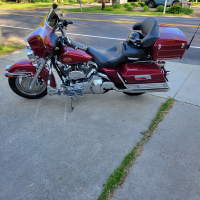Reforming Dies
 Oakie
Member Posts: 40,524 ✭✭✭✭
Oakie
Member Posts: 40,524 ✭✭✭✭
I will get a somewhat better response in GD, then Reloading, so I wanted to ask a question here. I want to purchase reforming dies for this 256. Mike was kind enough to send me the reloading dies, but I also need to buy reforming dies to go from 357 to 256. Question is how many dies are in this set??? I see some that are three die sets, but most are single die sets. Everywhere I looked, the had one die listed. Then last night I was reading the description of the die, and it said, Most people that buy die number one, will need die number two. Then there was another die that is a case trimming die??? Is that necessary, or can I just use my RCBS case trimmer ??? I understand the process of reforming the case, But how many dies does it take exactly??? I really appreciate any help. This is my first time reforming brass with dies. Oakie


Comments
I vote for the trim die. I believe you will have almost a half inch to trim and while a case trimmer certainly can do that it will be pretty slow by comparison. Bob
"certainly can do that it will be pretty slow by comparison".....THE 1ST THING I DID WHEN I GOT A 'CASE TRIMMER' WAS MAKE AN ADOPTER FOR MY BATTERY DRILL.........ZIP & DONE. As to the forming dies; going from .357 to .257 is a bunch so at least a 2 die set, you could try the dies you have and go in 'steps' (a litle at a time).
Several steps is much better. Trying it in one pass is liable to crush an unacceptable number.
In my wildcatting days, I formed a boxcar of cases. The one where a trim die was most helpful was .30-30 to .30 Herrett. I used a powered case trimmer to shorten .41 Maggies to .41 Special, but did tear the mouths of some when I got too forceful. Turning 9mm Para to 9 Makarov was easier, with only a millimeter of brass to trim. Turning 7-08 to .25 Souper only involved the regular sizing die and a good lube.
I did play with the .256 for a short time, but don't recall how or if I had to form cases. It was a loaner barrel for my Contender. (If memory serves, the owner sent me dies and cases with it.) It was an interesting if impractical round; too much for edible small game and not quite enough for anything else (except raccoons, Oakie!)
I've messed around with the .256 in a Marlin 62 and a T/C Contender.
What worked for me, useing the trim die, Imperial sizing wax (Redding), start the case in, slowly about half way, pull the case out, take your fingers and re-smear the lube and then run the case in all the way.
No mater what you do, every once in awhile you will ruin a case.
Thank you everyone. I did the same as Mike. I made and adaptor for my cordless drill. I will spend the money and buy the case trimmer though. Like everyone has suggested, My father also said to move in small increments. I have plenty of imperial wax and case lube. When I get started, I will ask for more help if I run into a problem. Thanks again.
Trying to make a large caliber reduction in a single pass, as with a single die can result in a fair number rejects due to crimps forming. Some brands of brass can tolerate it fairly well, and others will not probably due to different brass thickness. You may also have to deal with apparently well-formed cases having the the brass at the case mouth too thick requiring reaming.
You probably already know this but annealing the cases after that much sizing would be a good thing. Easy to do and will keep you from splitting that newly formed brass. Bob
I make .357 Herret cases from a 30-30 case it was only one die and a hacksaw.
I just ordered a annealing machine . It should be here by next Wednesday. 285 bucks off Amazon. Pop said the same thing, so I purchased one. I will probably use it a couple of time and get rid of it. LOL
I neck down quite a few different calibers. I use a dremel tool and scratch off the old caliber head stamp before priming.
One of the things that I check is the diameter of the neck AFTER a bullet is seated even if the necks have been turned.
The max neck dimension thickness is listed in reloading manuals.